NCSA Summer Research Exposes Undergrads to Open Source Software, Possible Future Careers
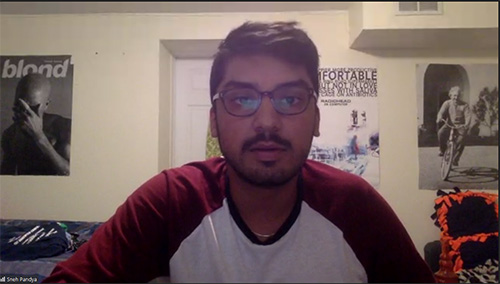
Sneh Pandya presents his research via Zoom during NCSA's Summer 2020 Undergraduate Research Symposium on July 31st.
August 4, 2020
Exactly what is open source software? During the summer of 2020, thanks to the National Center for Supercomputing Applications (NCSA), four undergraduate students who participated in the REU INCLUSION (Incubating a New Community of Leaders Using Software, Inclusion, Innovation, Interdisciplinary and OpeN-Science) discovered just what open source software is: mostly free software whose source code is made publicly available so users can modify it to suit their needs. As part of this Research Experience for Undergraduates (REU), the students also helped to develop and contribute to some primarily open-source software projects. However, this software-in-research training experience was not just about exploring open source software and programming; students also received professional development, learned about how to present research then actually did so, plus made some relationships and networked with Computer Science researchers. In addition, a fifth student, a returnee from last year's REU INCLUSION, also conducted research as a part of NCSA’s International Research Internship.
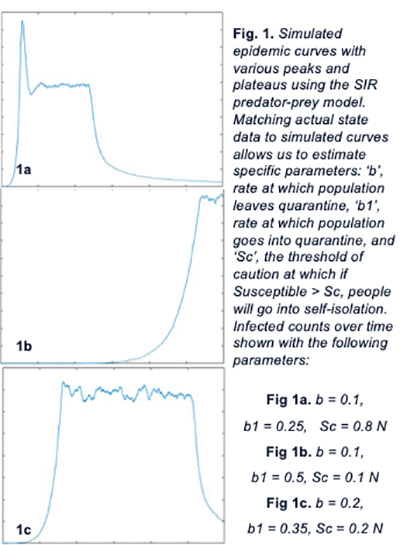
Mary Cook's figures depict COVID-19 peaks and plateaus. (Image courtesy of Mary Cook.)
The three-year, NSF-funded REU began in 2017 and, to date, has trained 32 undergraduate students, 75% of whom were minority students and/or underrepresented in STEM. Then, for summer 2020, INCLUSION received a no-cost extension which allowed it to operate a fourth summer. The bonus summer enabled the program to expose several more under-served students to software projects.
As part of the main emphasis of the REU, students were assigned to various NCSA researchers and conducted primarily open source software research projects. Under their mentors, students worked 33-35 hours a week. Plus, they attended 5-7 hours of professional development a week about a variety of topics, including how to present research.
Also, in an effort to align with another of the REU’s goals—to make the population of software developers more diverse—the 2020 cohort included two Hispanic students from the Inter-American University of Puerto Rico, as well as one woman—also currently underserved in computer programing. However, regarding some of the other INCLUSION goals, because this was a no-cost extension year, each undergrad had only one mentor, not two–each from a different discipline–as in past years. Also, unlike in previous years, due to COVID-19, the REU was not a residential experience where students discovered what campus is like. But despite these differences, student participants still gained skills they hope to use in the future.
To begin the experience, NCSA’s REU INCLUSION held a Zoom orientation session on Monday, June 1st, where students were introduced to the REU PI, Daniel Katz, and Olena Kindratenko, the project coordinator.
The REU INCLUSION had interactions with other REU programs on campus, especially NCSA’s SPIN (Students Pushing INnovation) program, a year-round undergraduate research program. For instance, REU INCLUSION undergrads joined SPIN fellows for professional development, including Python training sessions on June 1, 3, and 5, and a Data Management session on June 4th, designed to train participants to perform their research. In addition, the REU INCLUSION fellows participated in joint Lightening Talks with SPIN fellows, and also had the opportunity to participate in social events organized by other campus REU programs.
While the main emphasis of the REU program was performing research, participants were also expected to report on it. Each gave a Lightening Talk, wrote short reports detailing their progress, wrote a research report, and prepared then presented posters as part of NCSA’s Virtual Undergraduate Research Symposium held on July 31st.
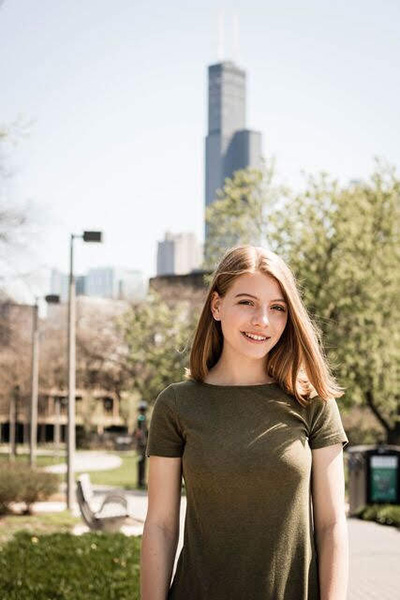
Mary Cook, a rising Bioengineering junior at Illinois who researched the impact of COVID-19 quarantine. (Image courtesy of Mary Cook.)
Following are short bios about the INCLUSION fellows, descriptions of their research, some challenges they faced, plus some of the positive impacts of their research experiences. For instance, one of the two undergrads from the University of Illinois at Urbana Champaign who participated in the REU was Mary Cook, a rising junior majoring in Bioengineering at Illinois. She learned about the REU INCLUSION opportunity while participating in NCSA’s SPIN program. Her SPIN internship mentor informed her about the REU INCLUSION program and welcomed her to apply as well if she was interested in a more full-time opportunity. Wanting to gain research experience over the summer, she applied.
Cook's project was very timely. Entitled "Epidemic Wave: Nowcasting and Forecasting of Covid-19 in Illinois and Beyond with Various Intervention Protocols,” it sought to model COVID-19 in the US through data analysis and stochastic simulation for understanding and prediction of virus activity. She reports that they built upon the classical Susceptible - Infected - Recovered model via the addition of a Quarantined state through which they produced preliminary simulations to investigate the effect of certain parameters (the rate at which population goes into quarantine, leaves quarantine, threshold of caution).
For Cook, the most challenging part of the summer was working remotely. “It was difficult to communicate only via email and Zoom with my mentor, rather than in person,” she admits. “I found that being vocal about my struggles and having frequent meetings with my mentor helped me to overcome this initial challenge.”
Cook claims that she benefitted from the experience in a number of ways. In addition to developing her literature review skills, she “gained more familiarity with modeling, specifically in Matlab...I did not have much coding background,” she admits.
According to Cook, participating in the REU has definitely impacted her future career plans. “Yes, through the professional development workshops I learned about the Master of Engineering program and decided this was something I would be interested in pursuing post-graduation.”
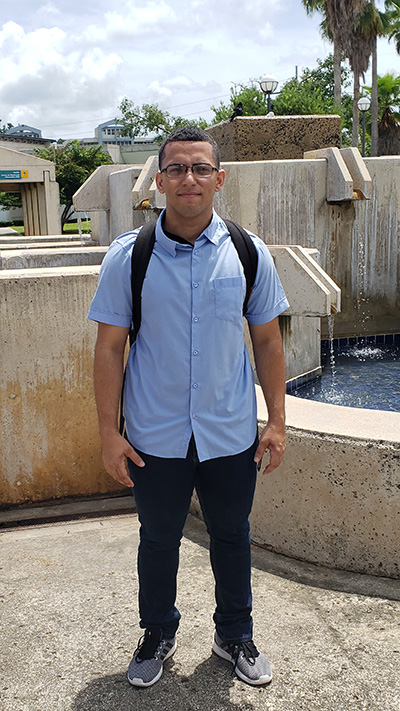 Hector Cruz, a 5th year Computer Engineering senior from Interamerican University of Puerto Rico-Bayamon. (Image courtesy of Hector Cruz.)
Hector Cruz, a 5th year Computer Engineering senior from Interamerican University of Puerto Rico-Bayamon. (Image courtesy of Hector Cruz.) One of the two Hispanic REU undergrads was Hector Cruz Santiago, a rising 5th year Computer Engineering senior at the Interamerican University of Puerto Rico-Bayamon. Cruz says he participated in the REU INCLUSION because he was “looking to get professional experience” for his resume.
“And thankfully I was accepted,” he continues. “I heard about it from a colleague in a group chat where he said that the REU INCLUSION program had opened a few spots to virtual internship due to COVID, and I immediately applied.”
Cruz worked with Dr. Zeynep Madak-Erdogan on a project entitled, “Resolving Racial Health Disparities by Using Advanced Statistics and Machine Learning on Complex Multidimensional Datasets.” During his research, Cruz identified biomarkers that show differences that could be causing a higher mortality rate among African-American women from breast cancer. He indicates that “Thanks to machine learning,” they were able to get 20 molecules that can predict breast cancer somewhat accurately, and from those 20, they could see the differences in numbers between African-American women vs Caucasian women that could be causing the spike in the mortality rate.
Cruz shares that the most challenging part of his project was the data cleaning aspect. “I had never done it before, and especially on a subject I've never even thought about before,” he explains.
Cruz indicates that he grew personally and as a student as a result of participating in INCLUSION. “I think the seminars given through the summer were very good and helped me with my own research, since I had no idea how to read or write a research paper.”
He adds that the experience also may have helped with his future career decision making. “This summer definitely impacted my career choices, since now I am leaning towards data science, but we'll see what's to come.”
The third scholar, also from Illinois, was Sneh Pandya, who researched “Black Holes with Deep Learning” mentored by Dr. Xin Liu. A rising senior at Illinois majoring in Physics on the professional track, and double minoring in both Math and Astronomy, Pandya shares why he got involved and what he gained from the program.
Previously an NCSA SPIN intern, Pandya reports that he had appreciated both the research and professional development aspects of the experience. So, when he received an offer to continue working for NCSA as an REU INCLUSION Fellow, he felt it was a great opportunity. “I appreciate all the resources and support I've gotten from NCSA up to this point,” says Pandya, “and would like to continue collaborating with them until I graduate.”
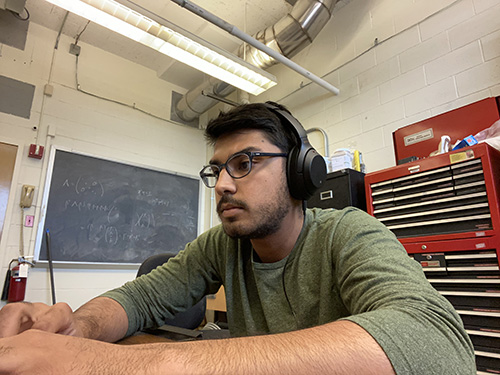
Sneh Pandya, a rising senior at Illinois majoring in Physics on the professional track, and double minoring in Math and Astronomy. (Image courtesy of Sneh Pandya.)
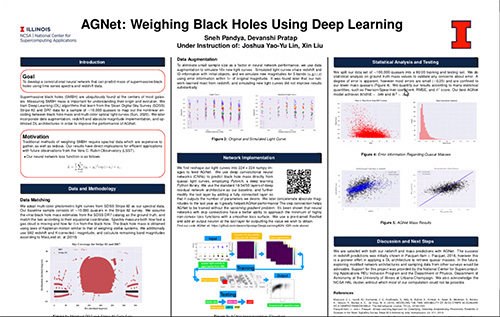
Sneh Pandya's poster which he presented during the July 31st closing ceremony.
Pandya's research this summer focused on using machine-learning algorithms, specifically convolutional neural networks, to determine the mass of supermassive black holes using light curve information and redshift. While he primarily focused on data analysis and statistics, he reports looking for ways to contribute to any aspects of the project that he could. In fact, he acknowledges that he recently “uncovered a very useful data attribute that was initially overlooked” when they started, which proved to be “very useful in improving the results of our network.” Pandya reports obtaining “plenty of promising results,” indicating that they are “investigating other features we can use in order to improve the performance of our network.”
One challenge Pandya encountered this summer was the workload. He recalls that as a SPIN intern, he worked with another undergraduate who was able to split the work with him, plus as a computer science student, his partner could also help with the computer science aspects. “Now that I'm the only undergraduate working on the project, the workload has certainly gone up, and I've had to seek other resources when I have problems with computer science…Overall it’s made me a harder worker and a better coder.”
Regarding how he’s benefitted from the program, Pandya acknowledges that when he first started, he had “almost zero computer science experience.” Assured that the best way to learn was to “just jump into the research,” he did so, and discovered that it was excellent advice.
“Now that I've been working on this project for about a year,” he admits, “I am much more confident in my coding abilities and have gotten plenty of insight as to future career paths I'd like to pursue.”
He’s also benefitted from having to report on his research. “I've also had plenty of opportunities through NCSA to give talks and poster presentations, which has made me a much better scientific communicator,” he says.
Pandya also acknowledges that participating in the REU INCLUSION has impacted his future career plans. After he graduates from Illinois, he plans to pursue a Ph.D. in applied physics or astrophysics. “Since working on this project, I've become very interested in all the possible applications of computing in science and would like to pursue quantum information science, computational astrophysics, or computational cosmology. Lots of good options, but sadly I'll have to pick just one.”
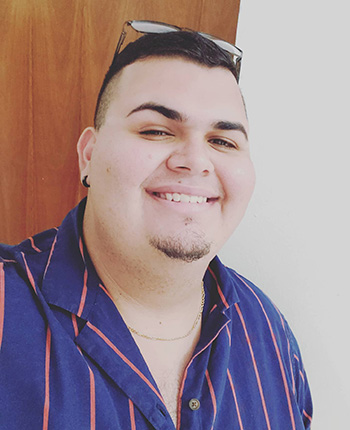
Arnaldo Rios, a rising 5th year Computer Engineering at Interamerican University of Puerto Rico. (Image courtesy of Arnaldo Rios.)
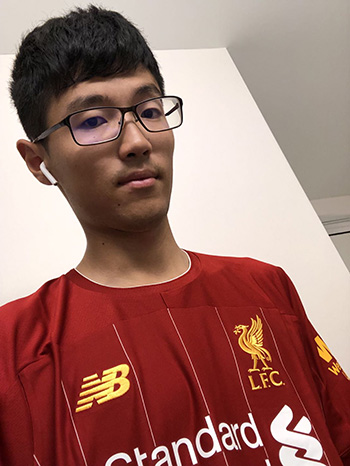
Xiyi Chen, a rising Computer Science senior at the University of Maryland. (Image courtesy of Xiyi Chen.)
Another REU INCLUSION undergrad, Arnaldo Rios Roman, who also attends the Interamerican University of Puerto Rico, will be a 5th year senior this fall majoring in Computer Engineering. Rios heard about the REU from a university group chat and “wanted to give it a try in order to have more experience in his area.” Rios, worked with Volodymyr Kindratenko on his Human Fall Detection research project. The model he created, he Fall Alerting System, can detect that a person has fallen with a 94% accuracy, and if a fall is detected, the program returns a message.
Regarding challenges he faced, Rios indicates that he and his team encountered several technical difficulties that they had to “work with and get around.” However, despite the challenges, he found the experience to be rewarding. “Not only I learned how to work with new tools,” he explains, “but also the experience and different people I met I consider is a reward.”
Has the experience impacted his future career plans? “Yes and no,” he reports. “I believe it has inspired me to do a Master's degree but at the same time, I stand by my choice to have work experience before doing a Master's degree.”
The fifth student, a returnee to campus from last year’s REU INCLUSION was Xiyi Chen, who participated as a part of NCSA’s International Research Internship program. A Computer Science major from the University of Maryland, College Park, Chen will be a senior this fall. Working with Dr. Andre Schleife, Chen's project was: “Computational Materials Science: Multi-scale Simulations and Machine Learning.” Chen worked 20 hours a week for 10 weeks from June 1st through August 7th, 2020.
Chen first heard about NCSA's REU program from NSF's REU website while looking for research opportunities for his sophomore year. “I enjoyed last summer that I spent at NCSA with some fruitful results on my research project and the people I met here. This summer, I was invited by Olena and my mentor Dr. Schleife to return and continue to work on the project.”
According to Chen, he and Schleife’s team are aiming for a publication by the end of this summer. His research focused on utilizing machine learning to replace the traditional approach to solve the optical properties of bi-layer materials systems. He says they achieved great results by implementing a stacked, Long-Short Term Memory (LSTM) neural network. However, this summer, they looked into the feasibility of a new approach incorporating predicting parameters for ten Gaussian curves then comparing their summation with the original spectrums.
One challenge Chen encountered this year was that the machine learning part didn’t work as well as they expected, since the loss was much larger compared to their approach last year. “We have partially concluded that this approach might not work well in the prediction of spectrums,” he admits.
Chen believes he’s gained a great deal from his experiences at NCSA. “I can tell that I have learned a lot about how to do research, as this is my first ever formal research experience. I have obtained knowledge on how to conduct a literature review, how to decide the approaches to attempt, and what information or figures we should present to the audience in a scientific research paper. On the basis of skills, I have learned a lot about machine learning techniques and the effectiveness of some specific architectures.”
Chen also acknowledges that participation at NCSA has helped with his career decision-making. “I definitely would agree that the summer I have spent at NCSA has impacts on my career choice. I have been more enthusiastic about research, especially those related to machine learning. I have decided to pursue a Master's degree upon graduation.”
For more I-STEM articles about the REU INCLUSION, see:
- REU INCLUSION Exposes Undergrads to Computational Research Using Open Source Software
- Illinois Summer Research Symposium Showcases Undergraduates’ REU Experiences
- Undergrads Experience Open Source Software & Interdisciplinary Research Via REU INCLUSION
- REU INCLUSION Seeks to Foster Diversity While Exposing Undergrads to Coding Via Open Source Software
Story and photographs by Elizabeth Innes, Communications Specialist, I-STEM Education Initiative.
More: Computer Science, REUs, REU: INCLUSION, Undergraduate STEM Outreach, 2020
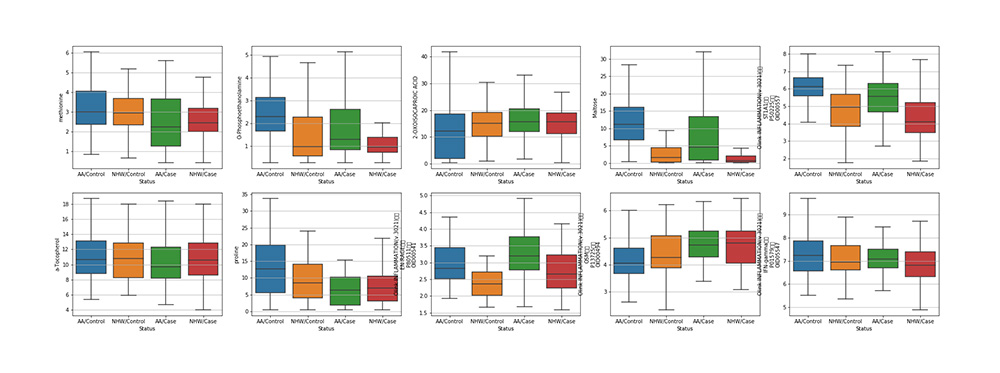
Hector Cruz chart of biomarkers that show differences that could be causing a higher mortality rate among African-American women from breast cancer.













.jpg)
















